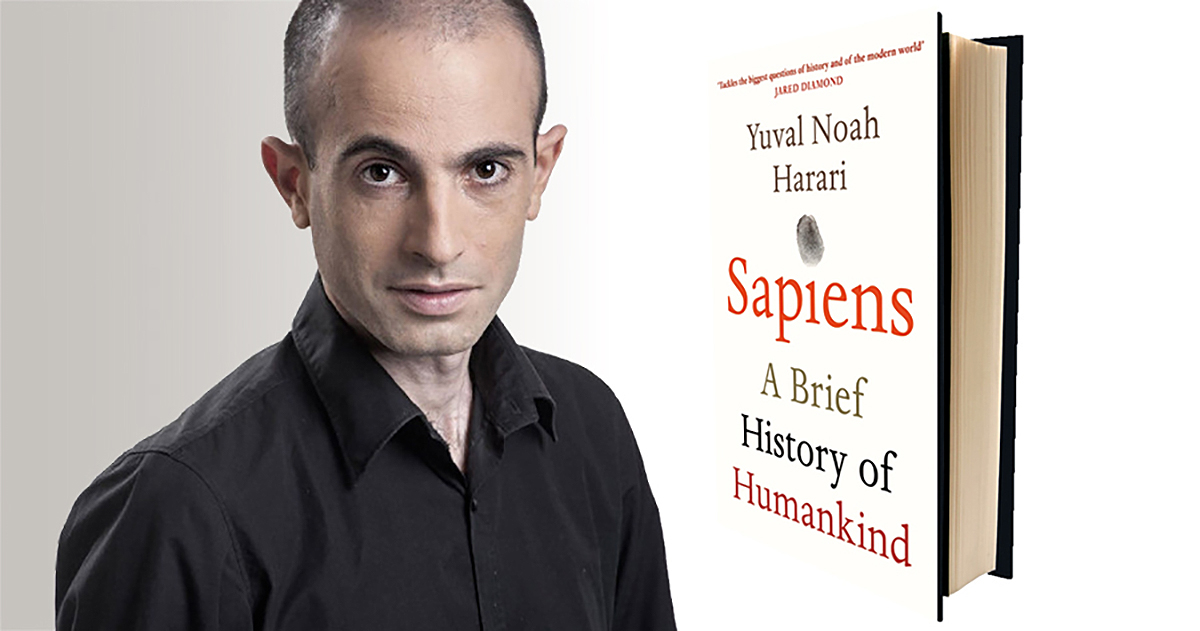


Sapiens:A Brief History of Humankind by Professor Yuval Noah Harari is a thrilling account of humankind's extraordinary history - from insignificant apes to rulers of the world. The author was in London recently, and I was privileged to be able to spend some time with him to discuss the book and other related matters.

What struck me most about Professor Harari's thoughts and views was how bold and clear they are; complex issues are expressed simply and elegantly. And whilst one may not agree entirely with every speculation and causal connection, the ensuing debate regarding our collective journey through time and its direction in the future is guaranteed to be inspirational.
The Foundation will be working with the author in the ORIGINS section, where we examine the future of Homo sapiens - are we still evolving?
Take a look at this:
Upgrading the world
When we think about the future we generally think about a world in which people who are identical to us in every important way enjoy better technology: laser guns, intelligent robots, and spaceships that travel at the speed of light. Yet the revolutionary potential of future technologies is to change Homo sapiens itself, including our bodies and our minds, and not merely our vehicles and weapons. The most amazing thing about the future won't be the spaceships, but the beings flying them.
Humans are going to upgrade themselves into gods. That is, humans will acquire abilities that in the past were considered divine, such as eternal youth, mind reading, and the ability to engineer life.
Physicists define the Big Bang as a singularity. It is a point at which all the known laws of nature did not function. Time too did not exist. It is thus meaningless to say that anything existed 'before' the Big Bang. We may be fast approaching a new singularity, when all the concepts that give meaning to our world - me, you, men, women, love and hate - will become irrelevant. Anything happening beyond that point is meaningless to us.
Professor Harari has twice won the Polonsky Prize for Creativity and Originality, in 2009 and 2012. In 2011 he won the Society for Military History's Moncado Award for outstanding articles in military history. In 2012 he was elected to the Young Israeli Academy of Sciences.
Sapiens:A Brief History of Humankind. (London: Harvill Secker, 2014).
To read more:
http://www.bradshawfoundation.com/origins/big_questions.php
Peter Robinson, Editor
by Bradshaw Foundation
Tuesday 21 March 2023
by Bradshaw Foundation
Tuesday 07 February 2023
by Bradshaw Foundation
Thursday 19 May 2022
by Bradshaw Foundation
Tuesday 19 October 2021
by Bradshaw Foundation
Friday 25 June 2021
by Bradshaw Foundation
Monday 09 November 2020
by Bradshaw Foundation
Tuesday 03 November 2020
by Bradshaw Foundation
Wednesday 28 October 2020
by Bradshaw Foundation
Tuesday 23 June 2020
by Bradshaw Foundation
Thursday 04 June 2020
by Bradshaw Foundation
Thursday 14 May 2020
by Bradshaw Foundation
Tuesday 12 May 2020
by Bradshaw Foundation
Wednesday 19 February 2020
by Bradshaw Foundation
Tuesday 21 January 2020
by Bradshaw Foundation
Monday 20 January 2020
by Bradshaw Foundation
Thursday 28 November 2019
by Bradshaw Foundation
Tuesday 21 March 2023
by Bradshaw Foundation
Tuesday 07 February 2023
by Bradshaw Foundation
Thursday 19 May 2022
by Bradshaw Foundation
Tuesday 19 October 2021
by Bradshaw Foundation
Friday 25 June 2021
by Bradshaw Foundation
Monday 09 November 2020
by Bradshaw Foundation
Tuesday 03 November 2020
by Bradshaw Foundation
Wednesday 28 October 2020
by Bradshaw Foundation
Tuesday 23 June 2020
by Bradshaw Foundation
Thursday 04 June 2020
by Bradshaw Foundation
Thursday 14 May 2020
by Bradshaw Foundation
Tuesday 12 May 2020
by Bradshaw Foundation
Wednesday 19 February 2020
by Bradshaw Foundation
Tuesday 21 January 2020
by Bradshaw Foundation
Monday 20 January 2020
by Bradshaw Foundation
Thursday 28 November 2019
Friend of the Foundation











